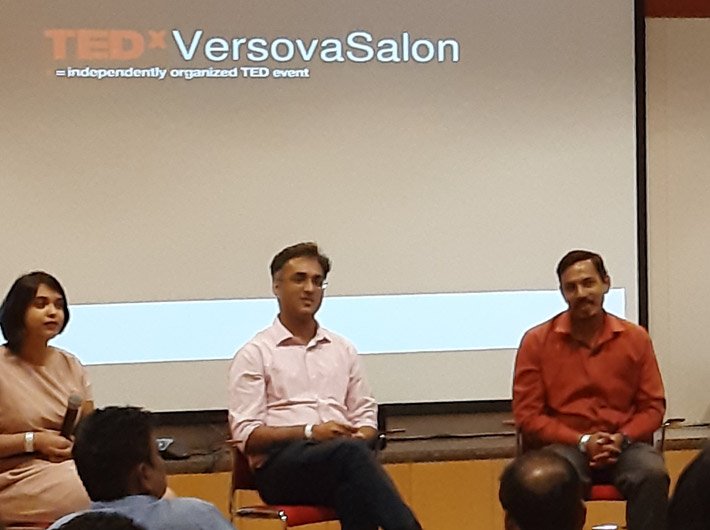TEDxVersova Salon discusses increasing momentum of community work to bring change
With Mumbai city battling myriad civic issues and annual flooding year after year, stakeholders and experts came together to discuss ways of dealing with these issues as community work. The discussion was held at the TEDxVersova Salon- Vibrant Civic Participation, an independent TED event organized by the US Consulate, Mumbai.
Despite regular cleaning through the year, every monsoon Juhu Beach becomes a carpet of plastic waste. The plastic is thrown out by the waves on the sea. How does this plastic come to the beach, asked Zahida Banatwala, coordinator, K-West, AGNI. “It comes from nullahs. With 60% of Mumbai’s population living in slums where all the waste and plastic are thrown into the nullahs, it goes into the sea and then comes to the beach. Our bins have become spittoons. A person walking past a bin will remember to spit inside but not use it to throw dry garbage there and invariably throw it outside. Our public needs lot more education.”
Civic issues need community participation and follow-up. Firefighting on an individual level will not achieve results. The BMC is responsible for storm water drain cleaning, desilting, nullah cleaning, street cleaning, fogging, adequate street lighting for safety, and monitoring beach cleaning as part of the group, among other things.
“With road surface programme coming up we will have to monitor the strength of concrete used by ways of tests. Our ward councilors have funds to provide bins and tumblers for composting, solar panels etc. Citizens can engage with their respective ward councilors and share their problems with them and immediately thereafter form a committee that will regularly engage with the councilor,” suggested Banatwala who is also part of Juhu Citzens Welfare Group. She added that hundreds of agencies are not doing anything but there are thousands who are doing work yet not getting desired results.
“On a daily basis everyone needs to join the momentum and give their suggestions to their local area representatives for further action. Change will happen gradually. We work continuously with BMC, police, traffic police and elected representatives. Every day we learn, grow and the scope of work expands further.”
Responding to a query on how to make civic issues more inclusive so that marginalized communities adapt to beneficial solutions, Banatwala recalled her own journey as a civic activist when as a young mother who would go to drop her son to the bus stop she would notice open drains with rats jumping around and worry what if it bit her child. Without knowing anything or anyone on civic issues she found the address of the area BMC office, met the assistant municipal commissioner, asked him about open drains and what he was doing about it.
“He was appalled at my question. I felt so strongly about it that I did not rest till the local drains were covered and a footpath was constructed there. I found who is the ward corporator, concerned MLA and I approached the then area MP and asked him to build a footpath there. Time, status or type of work you are going to take up is no bar to begin. If you are in slum, it does not mean you don’t have a voice. I can assure you 90% of the time you will meet success. The quality of people entering politics is changing. People are receptive to the idea that they are entering a service industry. Some may also consider politics a business. Largely people are willing to bend. If you take the first step you will not be disappointed,” she assured.
Milind Mhaske, director, Praja Foundation, an NGO that works in the area of governance and civic issues, said that in developed economies people engage a lot with their leadership. He observed that even though people want to get involved in civic issues they are not reaching the right medium. He suggested that citizens reach BMC on its twitter handle, @mybmc, or call on its helpline number, 1916.
“We need to go beyond the ballot box, meet and engage with our elected representatives – the councilor, MLA and MP, as it is their responsibility and give them feedback. They are available on social media or people can meet them personally as they are indeed approachable. There is no short cut to it,” said Mhaske as he added, “Civic education can be imparted by our schools and our political parties to encourage participation. Our education system has failed our youth.”

